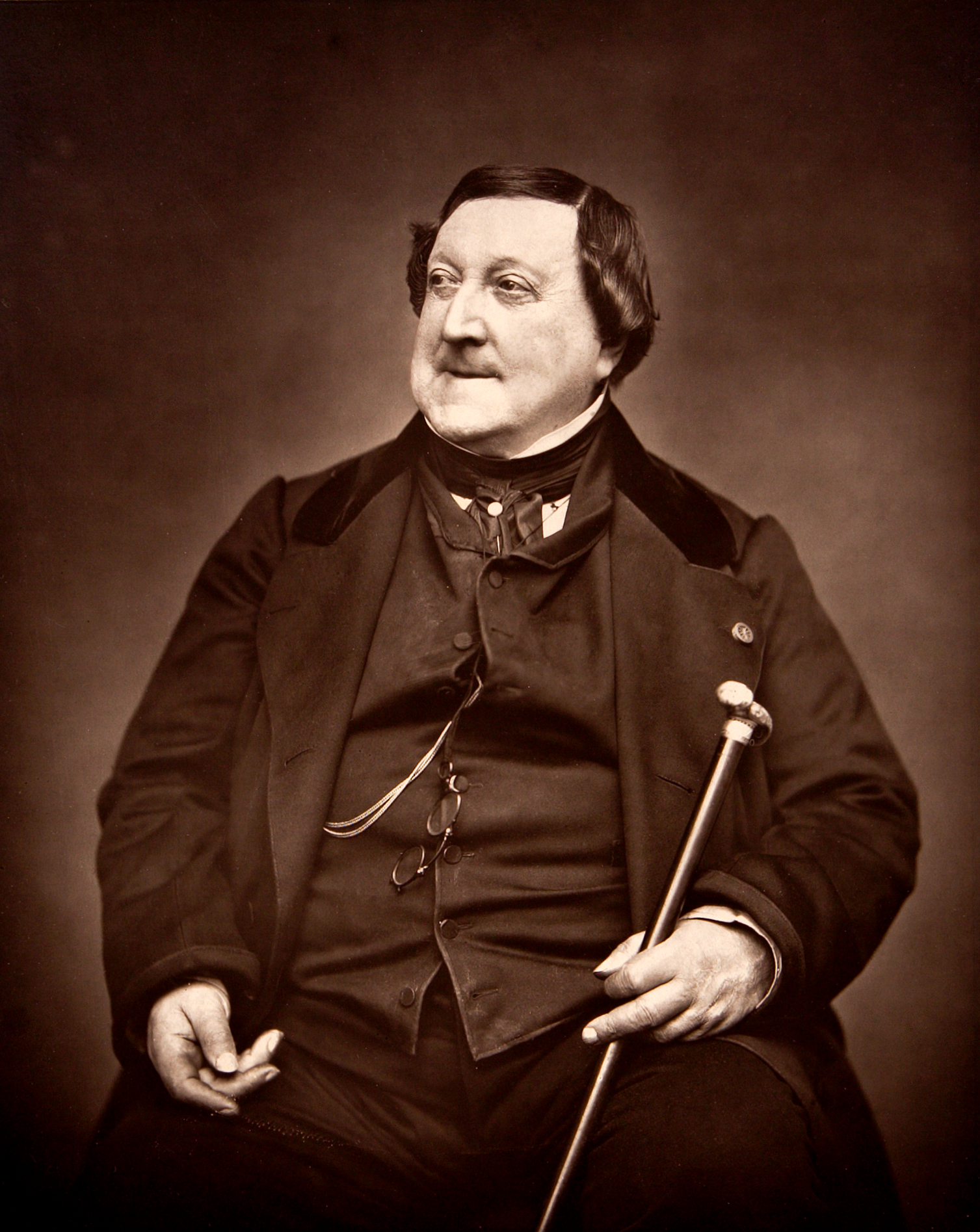PLOT
Il turco in Italia is a typical plot based on disguise and misunderstanding.
Two runaway Turkish slaves, Zaida and Albazar, are living with a group of gypsies outside Naples. Zaida misses her former owner Selim>, whom she loved. Don Geronio comes to consult a fortune-teller since he needs advice on how to handle his flighty wife Fiorilla. The poet, who is trying to find the subject for a new comedy he has been commissioned to write, looks on. Geronio is not pleased by the forecast. The poet comforts Zaida with the news that a Turkish ship is expected soon. At the harbour, Fiorilla is bored, so takes an interest in the arrival of this ship. On seeing her, Selim> adds to his praise of Italy a verse in praise of Italian women. Fiorilla’s existing lover, Narciso, also puts in an appearance. The poet begins to see the germ of an idea developing. The husband and lover both overhear his musings and take umbrage.
At home, Fiorilla entertains Selim> to coffee, and after interruptions by Geronio and Narciso, makes an assignation for the same evening. Geronio is a complete failure in his attempt to exert some discipline on his wife. The assignation goes adrift when Fiorilla meets Zaida, and they have an argument. Selim> offers to buy Fiorilla from Geronio. A masked ball is imminent. The poet stirs the plot further by suggesting to Geronio and Narciso that they disguise themselves as Selim> to foil Fiorilla’s attempt to abscond. Zaida disguises herself as Fiorilla, so the outcome at the ball is complete confusion, and Fiorilla is threatened with public disgrace. At this she at last returns to her husband, and Selim> settles for Zaida. The poet’s plot is complete.
ACT BY ACT
”The Turk in Italy”
Opera in 2 acts
Sung in Italian
About 2 hours 30 min + interval
18th Century, in and around Naples
Act 1
By the sea shore near Naples
The poet Prosdocimo (baritone) is searching for a plot for a drama buffo. He meets a band of Gypsies, including the beautiful but unhappy Zaida (mezzo-soprano) and her confidant Albazar (tenor). Perhaps the Gypsies can provide some ideas? Prosdocimo's friend, the obstinate and sometimes foolish Geronio (bass), is looking for a fortune teller to advise him on his marital problems, but the Gypsies tease him. Zaida tells Prosdocimo that she is from a Turkish harem. She and her master, Prince Selim, were in love, but jealous rivals accused her of infidelity and she had to flee for her life, accompanied by Albazar. Nevertheless, she still loves only one man and that man is Selim. Prosdocimo knows that a Turkish prince will shortly be arriving in Italy. Perhaps he can help? Geronio's capricious young wife Fiorilla (soprano) enters singing (in contrast to Zaida) of the joys of free and unfettered love. A Turkish ship arrives and the prince disembarks. It is Selim (bass) himself. Fiorilla is immediately attracted to the handsome Turk, and a romance rapidly develops. Narciso (tenor) appears in her pursuit. He is an ineffectual admirer of Fiorilla posing as a friend of her husband. Geronio follows, horrified to learn that Fiorilla is taking the Turk home to drink his coffee!
Geronio's house
Fiorilla and Selim are flirting. Geronio enters timidly and Selim is initially impressed by his unexpected meekness, however Narciso noisily scolds Geronio. The domestic menage irritates Selim and he leaves after quietly arranging to meet Fiorilla again by his ship. Geronio tells Fiorilla he will not allow any more Turks - or Italians - in his house. She sweetly undermines his complaints, and then, when he softens, threatens to punish him by enjoying herself even more wildly.
The sea shore at night
Selim is waiting for Fiorilla. Instead he meets Zaida. The former lovers are shocked and delighted, and declare once more their mutual love. Narciso re-appears, followed by Fiorilla in disguise, with Geronio in pursuit. Selim confuses the veiled Fiorilla with Zaida and the two women come suddenly face to face. Fiorilla accuses Selim of betrayal. Zaida confronts Fiorilla. Geronio tells his wife to go home. There is a stormy finale.
Act 2
At an inn
Selim approaches Geronio amicably, offering to buy Fiorilla. That way Geronio can be rid of his problems and also make some money. Geronio refuses. Selim vows to steal her instead. After they leave, Fiorilla and a group of her friends appear, followed by Zaida. Fiorilla has set up a meeting between them and Selim, so that the Turk will be forced to decide between the two women. In the event he is indecisive, not wishing to lose either of them. Zaida leaves in disgust. Selim and Fiorilla quarrel but are eventually reconciled. As the poet tells Geronio, there is going to be a party. Fiorilla will be there to meet Selim, who will be masked. Geronio should also go - disguised as a Turk! Narciso overhears this, and decides to take advantage of the situation to take Fiorilla himself, in revenge for her former indifference. Geronio laments his destiny, that he should have such a terrible, crazy wife. Albazar passes by holding a costume - for Zaida!
A ballroom with masqueraders and dancers
Fiorilla mistakes Narciso for Selim and Narciso leads her away. Meanwhile, Selim enters with Zaida, under the impression that she is Fiorilla. Geronio is in utter despair at finding two couples and two Fiorillas! Narciso and Selim both entreat their partners to leave with them. Confused and angry, Geronio attempts to stop both couples, but they eventually escape.
Back at the inn
Prosdocimo meets Geronio. They now know that Selim was with Zaida and guess that Fiorilla was with Narciso. Albazar confirms that Selim will definitely stay with Zaida. Prosdocimo advises Geronio to have his revenge on Fiorilla by pretending to divorce her and threatening to send her back to her family.
Having discovered Narciso's deception, Fiorilla tries to find Selim, but he has already left with Zaida. She returns home only to find the divorce letter, and her belongings being removed from the house. She is devastated by shame, and promptly deserted by her friends.
The beach
Selim and Zaida are about to set sail for Turkey, while Fiorilla is looking for a boat to take her back to her home town. Geronio finds and forgives her. They are affectionately reconciled. Both couples are now reunited and Prosdocimo is delighted with his happy ending.
ROLES
Don Geronio – Bass
A Neapolitan gentleman
Fiorilla – Soprano (lyric coloratura)
Don Geronio's wife
Selim – Bass
The Turk
Narciso - Tenor
In love with Fiorilla
Prosdocimo - Baritone
A poet
Zaida – Mezzo-soprano
A Turk
Albazar – Tenor
A Turk
COMPOSER
Gioachino Rossini
1792 - 1868
Place of birth: Pesaro, Italy
place of death: Paris, France

BIOGRAPHY
Gioachino Rossini was an Italian composer known for shaping the style of Bel canto together with Bellini and Donizetti. He was born in Pesaro in a musical family and started music school in Bologna at the age of 12. His father was a trumpeter and his mother was a singer. During his career he wrote 39 operas, sacred music, chamber music, piano pieces and songs.
Rossini married the singer Isabella Colbran in 1822. It was a difficult marriage. Rossini wrote many roles for her, but her voice gradually declined and she was forced to retire. It put a strain on their relationship. They lived separately from 1830 when Rossini met Olympe Pélissier who was to become his future wife. In 1835 Rossini and Colbran officially divorced and 10 years later he married Pélissier who was his wife until his death. Rossini died in Paris after an unsuccessful operation to treat colorectal cancer at the age of 76.
Rossini was a very productive composer, writing on an average 2 operas per year for 19 years. However, for the last 40 years of his life he didn’t compose a single opera. It’s unknown why he stopped, but perhaps his declining health or financial security thanks to earlier successes gives us a clue. His most popular opera is Il barbiere di Siviglia, one of his many comic operas.
COMPOSER'S QUOTE
"Give me a laundry-list and I'll set it to music."
FUN FACTS
He was a celebrity during his lifetime. He suffered from insomnia. He met with Beethoven in 1822.
Most prominent operas
L’italiana in Algeri 1813
Il turco in italia 1814
Il barbiere di Siviglia 1816
La cenerentola 1817
Semiramide 1823
Il viaggio a Reims 1825
Le comte Ory 1828
Guillaume Tell 1829
LIBRETTO
Felice Romani
1788–1865
The Italian libretto was written by Felice Romani. It was a re-working of a libretto by Caterino Mazzolà set as an opera (with the same title) by the German composer Franz Seydelmann in 1788.
Felice Romani was an Italian librettist, poet and scholar of literature and mythology. His list of works is extensive producing nearly 100 librettos during his lifetime including many librettos for Donizetti and Bellini. His most famous works are Bellini’s I capuleti e i Montecchi, La sonnambula, I Puritani and Norma, Rossini’s Il turco in Italia and Donizetti’s Anna Bolena and L’elisir d’amore. He was regarded as the best Italian librettist of his age.
SCORE
DOWNLOAD THE SCORE
INSTRUMENTATION
2d1, 2, 2, 2 - 2, 2, 2, 0
timp, perc, harp, strings
Chorus
CONTEXT
Rossini's opera buffa was influenced by Mozart's Così fan tutte, which was performed at the same theatre shortly before Rossini's work. The oepra premiered at La Scala, Milan in 1814.

















